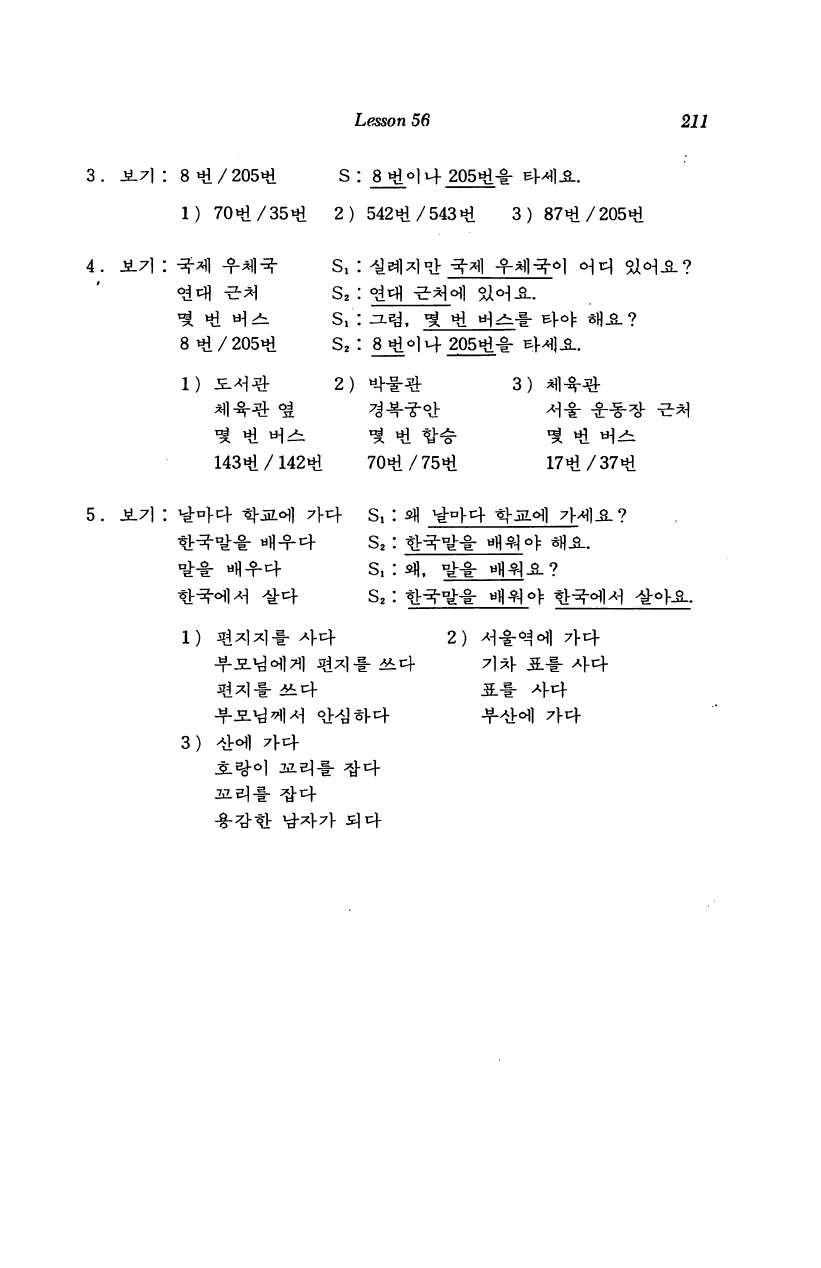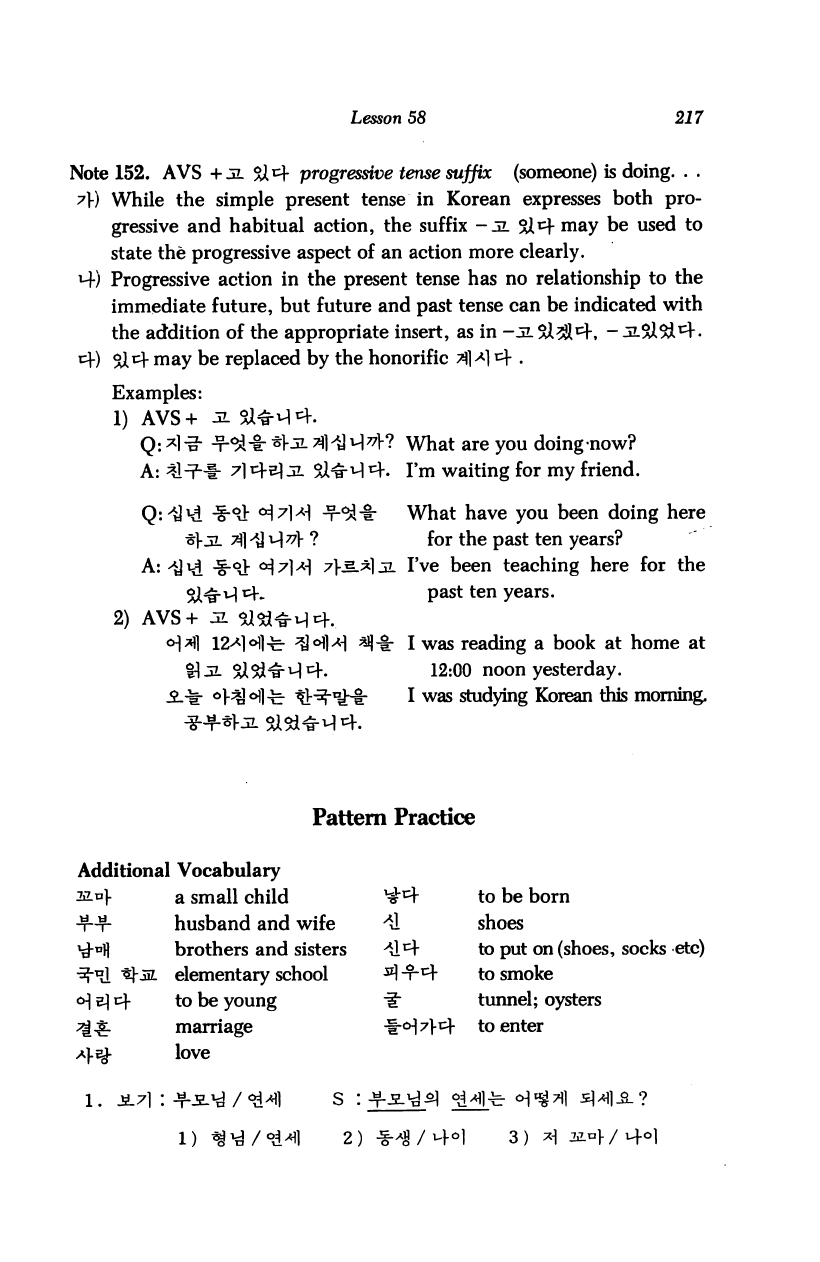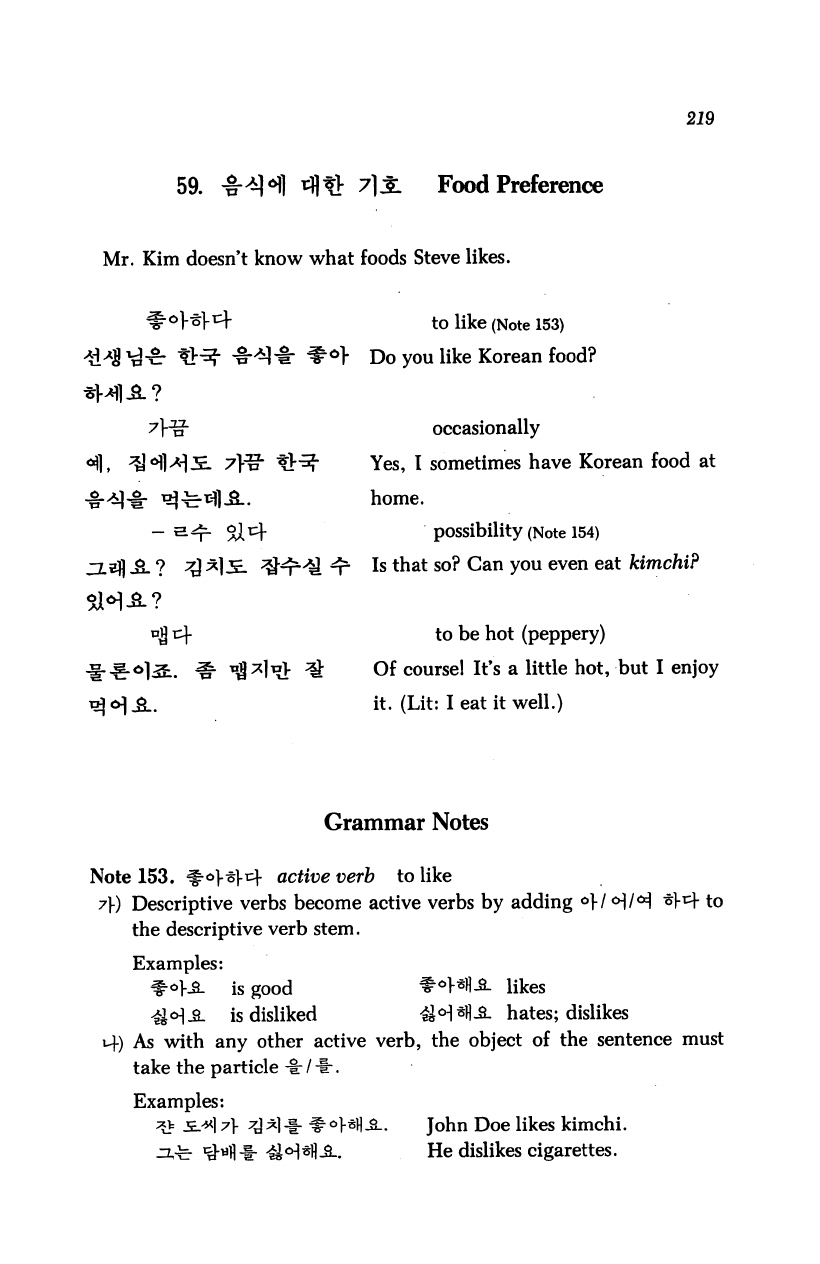Suk-in Chang. Modern Conversational Korean
Подождите немного. Документ загружается.


210
Modern
Conversational
Korean
vfl
o_j
^_
j=L^_o__g_
id)
uf
o
have
to
go
to
Pusan
tomorrow.
H-)
VS
+
o]-/<H/<^
o):
followed
by
verbs
other
than
tfcf
emphasizes
the
material
preceding
a):.
Examples:
^>
^-o].^.
?
Do
we
have
to
go
to
the
mountains
to
catch
a
tiger?
«l-i=H]
7}o):
«2.*1
(I)
have
to
go
to
the
ocean
to
go
swimming.
«fl
$!-&-.
(I)
have
to
go
to
school
in
order
to
learn
Korean.
(I)
have
to
eat
before
I
work.
Provided
it is
good
stuff,
I'll
buy
it.
Provided
it
doesn't
rain,
I'll
go.
?}£-.
Provided
Mr.
Kim
goes,
I'll
go
toe
Pattern
Practice
Additional
Vocabulary
library
gymnasium
Kyongbok
Palace
Seow/
Stadium
a
shared
ride
a
ticket;
a
label
to
have
peace
of
mind
s
:
2)
2.
1)
1)
s,:
S2:
2)
tiger
to
be
brave
to
catch
tail
the
back
of
the
neck
nod
one's
head
3)

Lesson
56
211
3
.
JiL7)
:
8
*!/205*1
S
:
8*H4
205Hi-8:
4.
JL71:
5.
8
*£
/
205»i
8
»1
«14
11
H^
142»1
2)
&*
3)
71-cf
1)
70>tl/35»i
2)
542*i/543»i
3)
87«i/205tl
S,
S2
S,
S2
2)
»^#
3)
«fl-s.?
s2:
s,:
s2:
■^-|-
Ml)
$\
SL
?

212
57.
»]+ ^7]
Riding
The
Bus
John
Doe
confirms
the route
once
more
with
the
bus
conductress.
o]
*)£l7}
<^rfl
*H1
7KSL
?
Does
this
bus
go
to
Yonsei
University?
quickly,
fast
(Note
147)
Yes,
hurry
and
get
on.
to
be
far
if
one
intends
to
...
(Note
148)
Are
we
still
far
from
Yonsei?
(Lit:
If
one
wants
to
go
to
Yonsei,
is it
still
far
away?).
bus
Stop
(Note
149)
No,
please
get
off
at
the
next
stop.
Grammar
Notes
Note
147.
*$t?)
^^
adverb
+
adverb
fast,
quickly
y\)
In
Korean,
as
in
other
languages,
adverbs
may
modify
adverbs.
Adverbs
which
modify
other
adverbs
are
called
attributive
adverbs.
M-)
When
the
attributive
adverb
is
the
same
as
or
similar
to
the
adverb
it
modifies,
the
latter
is
emphasized.
Examples:
«g-e]
-2-^1-Sl.
Come
quickly.
^
-T-
°fl
H
-2-
She
is
really
pretty!
(You)
speak
Korean
very
well.
Please
eat
a
lot.
(He/She)
did
a
lot
of
work.
Note
148.
VS
+(.£-)
tf
*£
pattern
If
one
intends
to
. .
.
;
if
one
plans
to
...

Lesson
57
213
7})
VS+
(.<>-)
5^
is
the
combination
of
-
(Sl)v\jl
*y&
(intention;
see
Lesson
43)
and
-^
(conjunction
in
the
subjective
mood;
see
Lesson
48).
In
other
words,
-(-£.)
^
*£
fc
a
contraction
of-^
JL
*f^.
Examples;
Q:
tH-*lHr
wfl-T-^^
^^l
If
one
wants
to
study
Korean,
what
*fl_a_
?
should
one
do?
A:
tJr^lHt
yfl-T-^^
t|-jL<Hl
If
you
want
to
study
Korean,
you
7|-c>|=
sj]
jl.
have
to
go
to
school.
Q-.^isH-^l^
<H^.S.7l-aL?
Where
should
one
go
if
one
wants
to
make
a
phone
call?
A:
^^--f-
^-^^
°-}*£2-3-
If
you
want
to
make
a
phone
call,
go
to
the
pharmacy.
Note
149.
^-^-^
noun
bus
stop
?r)
Useful
vocabulary
that
has
to
do
with
buses
and
trains:
l)^liflt^)^
city
bus
.£.-!?-
token
^]^1
t^j^1
inter-city
bus
*]-^
bus
girl;
bus
expressway
bus
conductress
^
express
bus
terminal
9i^H°^
expressway
bus
express
bus
conductress
local
(bus or
train)
-8:31
^1A1-
chauffeur;
driver
JL-g-
fare
(op*!*!)
(Lit:
driving
me-
M.
ticket
chanic
uncle)
2)
In
the
case
of
trains,
two
words
are
used:
^
literally
means
a
terminal
station.
However,
it
is
often
also
used
for
inter
mediary
stations.
It
is
generally
used
with
ia
prefix
as
3)
^7)^
means
train
stop;
however,
in
rural
areas
the
same
word
is
also
used
for
a
bus
stop.
Pattern
Practice
Additional
Vocabulary
Chosun
Hotel
^r*}^-
a
parking
lot
<£l
sightseeing
bus
^
-§->*].
Chondung
Temple
Folk
Village
4^131
a
photo
studio

214
Modern
Conversational
Korean
Kanghwa
Island
#:£•
night
clothes
to
wear
4^^
an
optician's
shop
to
finish;
to
complete
1)
3)
2.
ji7i
:
<2^ *H1
71-4
s
:
2)
3)
o
3.
ji.7i
:
H^/
°d^
^
s,:
<=>1
H^
s2:
c^l,
l)
^•-SL/^^^*
2)
4.
Study
the conversation
based
on
the
situation
described
in
the
example
and
then
construct
similar
conversations
based
on
the
situations
given
in
1),
2),
and
3)
below.
s,:
S2:
S,
:
s2:
2)
3)

215
58.
4
o]
Age
John
Doe
is
interested
in
Mr.
Kim's
family.
age
(honorific
of
4°1
,
Note
150)
How
old are
your
parents?
number
suffix
(counter
for
telling
age)
1,
Father
is
55
and
mother
is
49
years
old.
the
youngest
(Note
151)
t4°1-c-
Excuse
me,
but
how
old
is
your
youngest
sister?
high
school
to
attend;
come
and
go
(someone)
is
doing.
. .
(Note
152)
g-
JL^i-
She's
sixteen
years
old.
She
goes
to
high
school
now.
Grammar
Notes
Note
150.
*4°1
(honorific
9&*\])
noun
age;
years
of
age
7\)
Because
<&A]
is
honorific,
the
verb
endings
must
likewise
be
honorific,
irnr
is
also
honorific
and
may
be
substituted
for
^1.
M-)
^°]
on
the
other
hand,
may
be
used
with
both
familiar
and
honorific
verb
endings.
^W
When
speaking
of
one's
own
age,
-
^1
or
-
^
is
used
after
the
number.
The
counter
->fl
is
Chinese
and
-4t
is
Korean;
there-

216
Modern
Conversational
Korean
fore
Chinese
numbers
must
be
used
with
-
*\]
and
Korean
numbers
Examples:
I
am
eighteen
years
old
(Lit.:
my
age
is
18
years).
That
person
is
sixty-two.
He/She
entered
college
at
twenty.
That
elderly
person
is
about
^
u)
cf.
sixty
years
old.
Note
151.
^
noun
the
last-born;
the
youngest
of
the
family.
7»
Confucian
ethics
determine
many
relationships
in
Korea
and
there
fore
it is
important
to
differentiate
relationships
on
the
basis
of
age. ^vfl
and
'rt0]
have
to
do
with
sons
and
daughters,
e.g.
the
first-born
son
or
daughter
is
called
the
^
°]-i-
or
^
^
and
the
last
born
is
called
the
D-H
°Vi-
or
D-M
^.
When
sex
is
not
differ
entiated,
the
word
u^°]
indicates
the
eldest
son.
v+)
Sons
and
daughters
may
also
be
indicated
by
number:
(son)
31*11
on-
(first
son);
^
o^,
^
of*,
^j-^
°Hr
(second
son);
*]-^
°V*
(third
son);
D-H
<=>l-i-
(youngest
son)
2)
^(daughter)
%^
^
(first
daughter);
<£
*,
^
*.
^-^
■t^
*£
(second
daughter);
x\v]
4W
*
(third
daughter);
°}-m
'f-
(youngest
daughter)
Brothers
and
sisters
(^
^|)
1)
Male
sibling
relationships
are
expressed
by
the
words:
^
elder
brother
(of
a
male)
^-
-g-^g
younger
brother
(of
a
male
or
female)
elder
sister
(of
a
male)
younger
sister
(of
a
male
or
female)
2)
Female
sibling
relationships
aTe:
elder
brother
(of
a female)
younger
brother
(of
a
female
or
male)
elder
sister
(of
a female)
younger
sister
(of
a
female
or
male)

Lesson
58
217
Note
152.
AVS
+
jl
<&*)■
progressive
tense
suffix
(someone)
is
doing.
.
.
7\)
While
the
simple
present
tense
in
Korean
expresses
both
pro
gressive
and
habitual
action,
the
suffix
-jl
$Jtf
may
be
used
to
state
the
progressive
aspect
of
an
action
more
clearly.
*4)
Progressive
action
in
the
present
tense
has
no
relationship
to
the
immediate
future,
but
future
and
past
tense
can
be
indicated
with
the
addition
of
the
appropriate
insert,
as
in
-jl&^^K
-
JLSiSd1^.
cf)
51
cf
may
be
replaced
by
the
honorific
^l^m*
.
Examples:
1)
AVS+
3.
9X&iA
4.
Q:
*1
i?-
-t-^-I:
*V-2-
^l^H^V?
What
are
you
doing
now?
A:
^n2-!-
^l^-^JL
SiNrM^.
I'm
waiting
for
my
friend.
What
have
you
been
doing
here
for
the
past
ten
years?
.
I've
been
teaching
here
for
the
past
ten
years.
A:
2)
AVS+
I
was
reading
a
book
at
home
at
12:00
noon
yesterday.
I
was
studying
Korean
this
morning.
3Lu|-
l.
JL71
:
Vocabulary
a
small
child
husband
and
brothers
and
Pattern
wife
*
sisters
>
elementary
school
s
to
be
young
marriage
love
T-^'d
/
^1
l)
^/°d^
s
:
-¥-.
fl
2)
-i
Practice
^
to
be
born
&
shoes
^y\
to
put
on
(shoes,
socks
etc)
sI-t-4
to
smoke
£■
tunnel;
oysters
t-<H7]-cf
to
enter
H.^^1
^i>*fl-fer
cH^^l
5]^1-SL?

218
Modern
Conversational
Korean
2.
JL7)
:
2)
3)
3.
JL7l
:
JL-g-
4.
JL71
:
55/49
16
/
29
/
24
tf-g-^
19
/
aL-g-
s,
2)
3)
S2:
S,:
Sa
:
55
2)
70
/ 72
55/^14
12
/
10
n-M
-g-
12
/
^-°
5.
Talk
about
the
pictures
below,
using
the
pattern
AVS
+
S,:

219
59.
^H
rfl^
71J:
Food
Preference
Mr.
Kim
doesn't
know
what
foods
Steve
likes.
°}-s\cf
to
like
(Note
153)
*°>
Do
you
like
Korean
food?
occasionally
Yes,
I
sometimes
have
Korean
food
at
home.
possibility
(Note
154)
Is
that
so?
Can
you
even
eat
kimchi?
to
be
hot
(peppery)
Of
course!
It's
a
little
hot,
but
I
enjoy
it.
(Lit:
I
eat
it
well.)
Grammar
Notes
Note
153.
#<^>^1-^
active
verb
to
like
7})
Descriptive
verbs
become
active
verbs
by
adding
o}!*)!^
^^
to
the
descriptive
verb
stem.
Examples:
^°}SL
is
good
f^Hfl-S.
likes
4i°]3L
is
disliked
4W*fU-
hates;
dislikes
i4)
As
with
any
other
active
verb,
the
object
of
the
sentence
must
take
the
particle
-I:/*.
Examples:
]
7}
^*]-i-
f
°HB-S-.
John
Doe
likes
kimchi.
He
dislikes
cigarettes.
